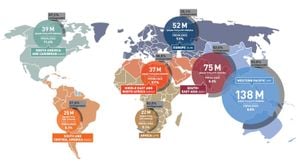China is weaving itself intricately within the fabric of the Caribbean and Central America, marking significant shifts in geopolitical relations and economic dependencies. With the implementation of its Belt and Road Initiative (BRI), China has set its course toward these tropical regions, propelling investments and infrastructure projects aimed at boosting bilateral trade and establishing long-term strategic partnerships.
The BRI, launched by China as its premier foreign policy strategy, seeks to create trade routes by developing infrastructure across the globe. Since its inception, multiple Caribbean and Central American nations have hopped on board, acknowledging the potential benefits of Chinese investments. Countries like Trinidad and Tobago, Cuba, Jamaica, El Salvador, Costa Rica, and Panama have all signed on to the BRI, integrating their economies more closely with China's, leading to questions about dependency and influence.
Indeed, the past decade has witnessed China emerge as the second-largest trading partner for many Caribbean and Central American countries, directly contributing to approximately $8.7 billion of foreign investment across the region as of 2023. This translates to investments in roughly 40 ports, significantly reshaping the maritime infrastructure and trade networks of these nations. Notably, the exchanges between China and Latin America hit approximately $208 billion in imports and $204 billion in exports, showcasing the rapid growth of trade relations.
Yet, with this growing involvement, geopolitical concerns have arisen. The reach of Chinese influence has sparked debates over maritime and land claims, particularly surrounding strategically important sites like the Panama Canal and prospective projects like the stalled Nicaragua Canal. Control over such significant chokepoints not only impacts trade but raises the stakes for US interests and military personnel operating within the region.
Taking the Panama Canal as a case study, China's investments have allowed it to integrate deeply with the operations surrounding this pivotal maritime artery. Despite being managed under the Panama Canal Commission since its handover from the United States, Chinese firms have found ways to penetrate its operational framework through various logistic contracts, particularly concerning the construction and management of ports at both ends of the canal. With about 40 Chinese companies involved, the concern of growing Chinese influence turning toward regional dominance becomes tangible.
Similarly, the proposed Nicaragua Canal project attempted to create another link between the Pacific and Atlantic Oceans. Pushed by the Hong Kong-based HKND Group, this ambitious project has struggled since construction began, facing significant backlash due to environmental concerns and community displacement. Although it faltered, the continuation of agreements and trade routes between China and Nicaragua highlights the resilient nature of Sino-Nicaraguan relations.
But why the increased focus from China? Much of it hinges on the long-term economic and strategic objectives at play, particularly amid intensifying global competition. The interest from not only China but also other BRIC nations like Russia is palpable as they seek to reshape their influence outside traditional power centers, including the US. Russia, for its part, has ramped up military exercises in the Caribbean, hinting at its own designs for influence.
For Caribbean and Central American nations, China's approach is often seen as devoid of the strict conditions tied to aid from Western nations. While some analysts caution against the so-called 'debt trap diplomacy,' many countries have embraced the terms being offered by Beijing. Loans from China have proven flexible, with nations like Jamaica repaying loans constituting about only 4% of their total external debt since 2005. Such constructions build confidence among nations seeking development without overwhelming indebtedness.
This blending of relationships is often characterized as South-South cooperation, where developing nations form mutual partnerships, balancing against traditional donor-recipient dynamics. China's loans and investments have positioned it as the bedrock of economic development for many countries within the region, signifying the potential for new fruitful economic frameworks.
Yet, the story is far from simple. The decision-making processes within the corridors of power in these Caribbean and Central American nations find themselves walking the tightrope of international scrutiny. Concerns of authoritarianism, ideological dependencies, and loss of autonomy have been highlighted by critics who point out the risk accrual of debt and influence. The Path to development alongside sovereign integrity entails difficult choices.
While infrastructure development, maritime enhancements, and construction projects dominate discourse, questions arise about long-term impacts. How much influence is too much? And what will it mean for regional partners when they navigate relationships not simply with China but with other key players like the US who may vie for maintained power and influence?
The development trajectories led by Chinese investments are interwoven within the fabric of transnational dynamics and intensifying global competition. Such pathways pivot on strategic relevance as they define and reshape relations among nations embedded within this new sphere of influence.
Moving forward, the outcomes of these entanglements remain uncertain. For the Caribbean and Central American nations, the balancing act of development, sovereign autonomy, and geopolitical tensions will shape the new narrative. The choices made now will echo across generations, defining the course of diplomacy, trade relations, and regional stability.



